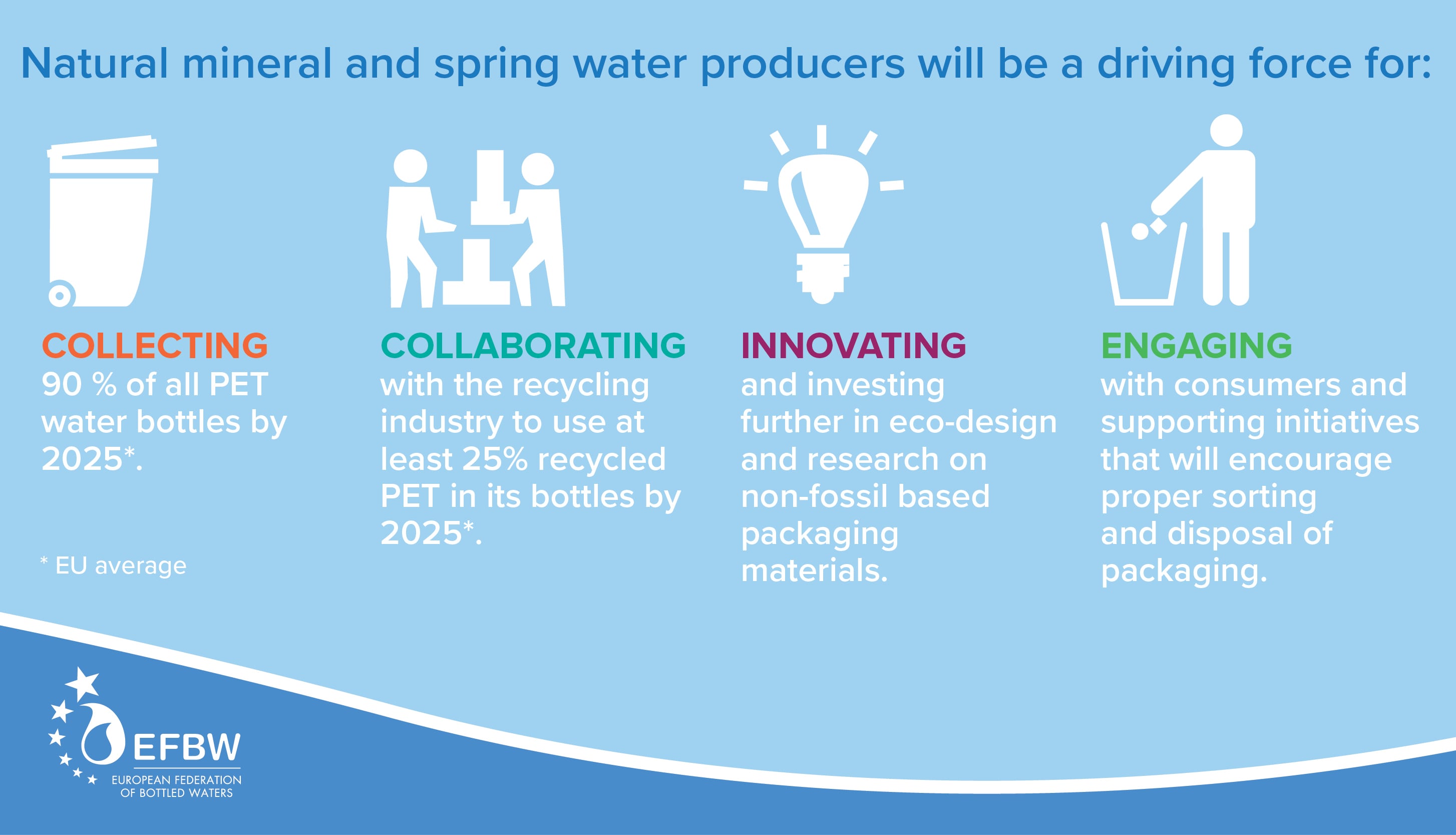The organisation, which represents almost 600 natural mineral and spring water producers around Europe, also pledges further innovation in eco-designs and research into non-fossil based materials.
The EFBW says that it will take a concerted, coordinated effort from stakeholders across the industry to drive positive change.

‘Even one bottle ending up as litter is one too many’
The level of collection of PET bottles varies substantially across the EU. The average recycling rate is near to 60%: but while some countries collect over 90% of PET bottles, others collect less than 20%.
Collection rates
- Germany: 92%
- Estonia: 88%
- Sweden: 83%
- Finland: 45%
- Lithuania: 35%
“We agree that action is needed to dramatically increase the collection, high-quality sorting and recycling of PET bottles," says the EFBW.
"The achievements of certain countries have shown that this is possible. We want them to be the norm, not the exception.”
The EFBW wants to see empty PET bottles viewed as a valuable resource, not as waste.
“EFBW believes that the solution lies in greater collaboration with the many value-chain stakeholders involved in ensuring that packaging is given a second life. We are committed to working together with them to accelerate the circularity of this valuable material.”
rPET
The European bottled water industry aims to use at least 25% rPET (recycled PET) in bottles by 2025.
However, one of the challenges for this target is ensuring a reliable supply of high-quality material, which adheres to strict legal requirements on structural design and food contact materials. Harmonising standards for plastic waste is an essential step to providing this.
“The amount of rPET used by producers in new bottles varies across brands and is dependent on a number of factors, such as the availability of high quality recycled materials, local infrastructure, competition for other uses with lower and fewer quality requirements, and the regulatory environment (need for EU approval of recycling processes and quality standards)," says the EFBW.
“By committing to an average uptake of at least 25% rPET by 2025, EFBW is pushing for the necessary conditions to be in place at national level.
"Firstly, adequate, harmonised standards for sorted plastic waste and recycled plastics are crucial to ensure that rPET can be safely used by the producers.
“EFBW members are already working on this within the European PET Bottle Platform, a voluntary industry initiative that provides design guidelines for recycling, and evaluates new bottle packaging solutions as well as technologies on the market.
"Mandatory standards, however, are non-existent. The European Committee for Standardisation and the industry should develop these in close collaboration.”
Manufacturer commitments
Evian (Danone): All bottles to be made from 100% rPET by 2025
Coca-Cola: 50% rPET in bottles by 2025 (up from 21% in 2016).
Nestle: 100% of packaging to become recyclable or re-usable by 2025
Innovation in new plastics
The EFBW says the industry will invest in eco-design and research on non-fossil-based materials. This includes further developments in light-weighting, eco-design (optimising design to reducing packaging waste), and research for plastics from renewable origin.
For example, the Polymark project, funded by the European Commission, enables automatic sorting of plastics into food and non-food contact plastics. This helps increase the amount of suitable secondary PET available.
The EFBW also pledges to run information campaigns to help consumers understand how to recycle their packaging.
The EFBW represents almost 600 natural mineral and spring water producers, with a membership base of 26 national trade associations and seven direct member companies.
“We are launching common initiatives at EU level while our members will implement these in their own countries,” explained Jean-Pierre Deffis, president, EFBW. "We will work together to reach these collective pledges, with individual associations and companies potentially going even further. The Federation will also monitor progress across its membership and help resolve any difficulties that may emerge.
"The EFBW will share best practices for example on packaging waste management in Europe. We will work to scale these practices up by cooperating with relevant stakeholders in the value chain. In this way, the Federation will help drive performance improvements within Member States which are currently facing difficulties in collecting their PET bottles."
